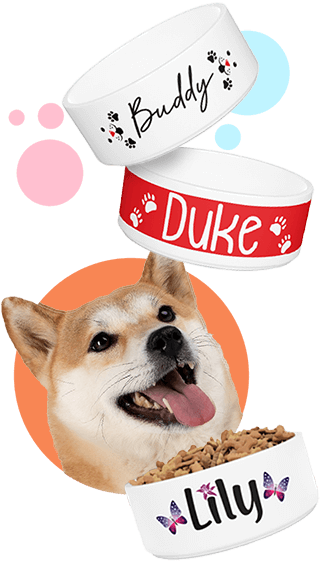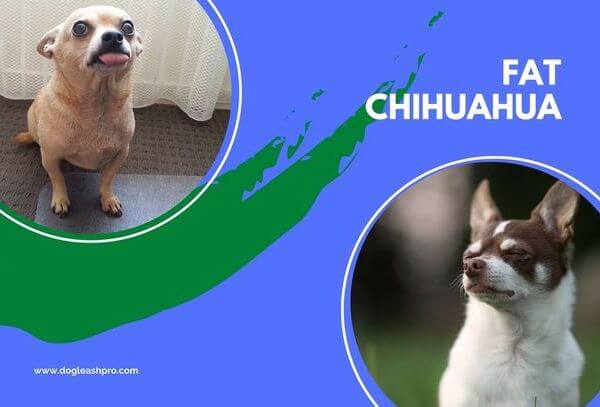

Do you show your Chihuahua love and affection by feeding him more treats and food than he needs? All of a sudden, you noticed he has gained some weight? Perhaps you read about how obesity can negatively impact your Chihuahua’s health and quality of life.
Maybe you’re the kind of owner who knows a Fat Chihuahua isn’t healthy but don’t know how to help him get back into shape. Don’t fret because in this comprehensive guide, we’ll discuss how to tell if you have an Obese Chihuahua, why do Chihuahuas get fat, how it affects their overall health, and ways to help your Fat Chihuahua slim down.
Before diving into the specific details below, it’s important to note that your Chihuahua’s weight issue can affect how long he lives. Feel free to jot down some notes from the information below to find out how to slim down an Obese Chihuahua and help him live longer.
Table of Contents
Fat Chihuahua: Is my Chihuahua Fat & How can I tell?

In the year 2008, the American Kennel Club (AKC) produced a two-page physical description of what they considered and recognized as the Chihuahua standard.
On the first page under Size, they stated that a Chihuahua dog that is “over 6 pounds in weight” does not qualify as a Chihuahua.
This is quite harsh to hear, but it also tells us one of the most crucial information about the Chihuahua dog breed. They should be at 6 pounds in weight or under.
Here are other ways to know whether your precious Chihuahua is fat, chubby, or overweight.
Difficulty feeling the bones in your Chihuahua’s body

When Chihuahuas eat excessively or ingest food that contains too much sugar, it can affect your Chihuahua’s metabolism.
When their metabolic changes can change your canine companion’s fat storage, muscle tone, energy levels, and immune system.
As a result, when you feel your Chihuahua’s abdomen, spine, hips, and shoulders, you may have a hard time feeling his bones.
If this is the case, then you have a Fat Chihuahua dog. The reason why you were unable to feel the bones is because of the thick fat that is surrounding the bones.
CHECK OUT: Why Do Chihuahuas Shake? 21 Surprising Reasons
Thoroughly examine your Chihuahua’s waist
Your Chihuahua’s waists are another way to tell if he is fat or overweight. When you look at your pooch from above, his waist should go in.
If you examine your Chihuahua’s waist from the side, his waist should be tucked up a little bit.
Essentially, the dog’s waist is visible since the body is slightly smaller from the back of his rib cage to his hips.
Here is a video to help you figure out if your precious Chihuahua is fat and overweight or at a healthy weight.
The Chihuahua dog breed is categorized by the AKC as a small or little dog and here’s how they define the body proportion of a Chihuahua:
“The body is off-square; hence, slightly longer when measured from point of shoulder to point of buttocks than height at the withers. Somewhat shorter bodies are preferred in males.”
AKC, Official Standard of the Chihuahua
Therefore, if you allow your Chihuahua to become fat, then he will generally grow larger and outward can grow up to 10 pounds or more.
READ ALSO: Chihuahua Growth Stages: How Big Do Chihuahuas Get?
Why is my Chihuahua so Fat?

If you’re wondering, “why is my Chihuahua so big and fat?” there are many reasons and factors that cause our little Chihuahua to gain weight and become fat.
Let’s go over 4 common causes that lead to a Fat Chihuahua or an Overweight Chihuahua.
1. Feeding your Chihuahua too much food (Overfeeding)
One of the main ways we show love and affection to our canine companions is by sharing our food with them (including our human snacks like a sweet Mochi dessert) or giving them way too many treats on a regular basis.
Over time as we continue to do this, our Chihuahuas will continue to pack on the pound.
Be careful if you do feed your small Chihuahua sweet human snacks since this can lead to dental issues like tooth decay, cavities, and other forms of dental disease.
That’s because the bacteria in your dog’s mouth use the sugar to produce acid and this acid is what breaks down the tooth’s enamel, which is the outer coating that protects the tooth.
Tooth decay and cavities not only cause bad breath in dogs, but also it can be painful.
Your Chihuahua may suffer from gum disease which is agonizing and this can affect how they feel, their mental and physical health, and their overall quality of life.
RECOMMENDED: Best Dog Toothpastes (Reviews & Top Picks)
What we recommend Chihuahua owners to do is to feed our fur babies just the right amount of food and a diet that is well-balanced, nutritious, and healthy.
The right proportion of food should not make your Chihuahua full, but rather satisfied.
Since Chihuahuas are a smaller dog breed, they only require fewer calories each day as compared to a medium or large dog breed.
This is why offering your pooch too much food or overfeeding him will heavily affect their size and weight.
DID YOU KNOW… Eating sweet treats can lead to plaque buildup on your Chihuahua’s teeth, leading to bacteria growth. Over time, this can result in dental problems like cavities, gingivitis, and periodontal disease, which are common in small dog breeds. Regular dental care, including brushing and professional cleanings, is essential to combat these issues, particularly if the Chihuahua is given sweet treats.
2. Your Chihuahuas are allowed to eat table scraps and food off your plate
While it is tempting to share our food with our Chihuahuas, it’s best that we don’t make this a habit or do this on a regular basis.
While we’re eating (and I do this too as a Chihuahua owner), we tend to peel a little bit of meat from our plate and share it with our four-legged friends.
Sometimes our guests share their food with our Chihuahuas as well. This occurs especially during the Thanksgiving dinner.
Last Thanksgiving, we had our aunt, uncle, and cousin over, and they couldn’t help but sneakily feed my Chihuahua some Turkey meat, mashed potatoes, and stuffing.
Although every once in a while is fine, it’s best not to do this every day or regularly.
That’s because there are tons of sodium, sugar, fat, and calories in the food we eat, which is neither healthy for our small Chihuahua nor canine-friendly.
Loads of sugar, fat, and calories can cause our furry family members to gain weight and become fat.
Additionally, ingesting too much sodium can cause salt poisoning in dogs.
3. Your Chihuahua isn’t getting enough daily exercise

In addition to overfeeding our Chihuahuas, they may not be getting enough exercise each day.
Our furry companions need their daily dose of exercise to strengthen their muscles, expend their energy, maintain their healthy weight, explore their surroundings, get some fresh air, and have fun.
Even Chihuahua owners who feed their pooch the right proportion of food may have a fat Chihuahua if their Chihuahua isn’t meeting their daily exercise quota.
Chihuahua owners should walk their small K9 friends at least 1 to 2 times each day.
During the walk, make sure they’re getting enough steps in and that you do not carry them the majority of the time.
DON’T MISS: Best Retractable Dog Leashes (Reviews & Top Picks)
This is a bad habit and only allows your Chihuahua to become lazy and too relaxed instead of being physically active.
Since our Chihuahua dogs are small, it’s best that we don’t over-exercise them. As long as your Chihuahua exercises daily and is consistent with it, he should be able to maintain a healthy weight or slim down.
4. Food portion and calories need to be adjusted as your Chihuahua grow older

When your Chihuahuas are in their younger years (puppyhood), they tend to eat more since they need more food to grow.
However, as they grow older, owners need to adjust their food proportions accordingly.
This is crucial because as the Chihuahua grows older, their diet changes a bit since they only require fewer calories each day per pound of body weight.
In this way, you’ll want to adjust their calorie intake. Their calorie intake should be lowered by 10 to 60 calories each day.
With the right proportion of healthy food and a consistent exercise schedule every day, your Fat Chihuahua will be able to slim down.
RELATED: How Many Puppies Can A Chihuahua Have?
Fat Chihuahua: 9 Reasons why obesity is dangerous in Overweight Chihuahuas
Canine obesity is a serious health condition that dog owners should not take lightly.
When it comes to obesity in dogs, it’s important to note that it can affect other areas of your canine companion’s life such that he or she may not want to go out and play and would prefer to lie around the house all day.
In turn, when dogs aren’t as active, it can affect their metabolism, weight, and mood, and this can affect their overall health and quality of life.
The good news according to VCA Animal Hospital is that canine obesity is preventable. They also added:
“In North America…Approximately 25-30% of the general canine population is obese, with 40-45% of dogs aged 5-11 years old weighing in higher than normal.”
If you know your Chihuahua is fat or overweight, it’s important to start taking steps to get him to his healthy weight again. If you’re not sure, we highly recommend that you bring your dog to see a veterinary professional.
There, your vet will be able to confirm whether your Chihuahua is overweight or fat and provide you with advice or instructions on how to get him down to his normal weight.
This advice and suggestions should be taken seriously to avoid putting your Chihuahua’s health at risk.
Some health issues your Fat Chihuahua may experience if this isn’t appropriately attended to are:
1. Diabetes Mellitus (Sugar Diabetes or Type II Diabetes)
Whether you have a Fat apple head Chihuahua, a Fat deer head Chihuahua, or a Fat teacup Chihuahua, your Obese Chihuahua is at risk of developing Diabetes Mellitus or Type II diabetes.
Once your Chubby Chihuahua has Type II diabetes, it may be difficult to cure and he or she may need to rely on insulin injections every day.
So how does this happen? Well, diabetes in Chihuahua can occur in one of two forms:
Insulin-resistance diabetes and Insulin-deficiency diabetes.
Since insulin-resistance diabetes commonly occurs in Fat Chihuahua, we’ll discuss this in more detail below.
Insulin-resistance diabetes:
When your Chihuahua is obese, it increases his or her chance of developing type II diabetes, insulin resistance, and impaired glucose metabolism.
Although the pancreas is producing insulin, your Chihuahua’s body isn’t making use of the insulin properly.
When the insulin sends out a message to remove some of the glucose from the blood and into the cells, the cells don’t respond appropriately.
As a result, there is glucose in the blood and not in the cells.
This is why it is called insulin-resistance diabetes and most Fat Chihuahua are prone to this type of diabetes.
2. High blood pressure or hypertension
High blood pressure is another health issue your Overweight Chihuahua may experience as a result of being obese.
If you suspect your Fat Chihuahua has high blood pressure, we highly recommend that you bring him to see the vet immediately or as soon as possible because this condition requires immediate medical attention.
That’s because high blood pressure in Chihuahua can be life-threatening and dangerous.
When your Chubby Chihuahuas have high blood pressure, their body tissues and organs are all negatively impacted.
This could lead to severe health issues such that the vital organs could fail and shut down completely.
READ NEXT: Blue Chihuahua (Complete Guide)
3. Joint problems
Chubby Chihuahuas may also start to experience joint problems, a common issue seen in obese canines of this particular breed.
Obesity puts excessive strain on a Chihuahua’s joints, leading to the wear and tear of cartilage.
Since Chihuahuas are a small breed with a delicate skeletal structure, the extra weight can cause more significant damage compared to larger dogs.
Inflammation and decreased mobility are often the early signs of joint problems, causing discomfort and leading to conditions like arthritis or hip dysplasia.
Maintaining an ideal weight through a balanced diet and regular exercise is essential to keep your Chihuahua’s joints healthy.
Overweight Chihuahuas can be put on a controlled diet plan by a veterinarian to ensure they get all the necessary nutrients without the extra calories.
Regular vet check-ups can also help monitor their joint health and manage any signs of discomfort early on.
Investing in preventative care, like joint supplements with glucosamine and chondroitin, can also benefit Overweight Chihuahuas struggling with joint issues.
This proactive approach will not only alleviate the immediate symptoms but also contribute to your pup’s overall long-term health and well-being.
You may be interested in: Why Are Chihuahuas So Aggressive? 7 Shocking Reasons
4. Difficulty breathing
Obesity in Overweight Chihuahuas can also lead to significant difficulty in breathing, a condition that demands immediate attention.
The excess fat in Obese Chihuahuas often puts undue pressure on the chest and diaphragm, causing the lungs to have less space to expand.
This leads to labored breathing and can exacerbate existing respiratory conditions.
The extra weight can also lead to tracheal collapse, a common issue in small breeds like Chihuahuas, where the trachea weakens and can partially obstruct the airway.
Managing a Chihuahua’s weight is crucial to prevent these respiratory issues.
Regular monitoring of their diet, portion control, and incorporating daily exercise can help maintain a healthy weight.
If obesity has already led to breathing difficulties, immediate consultation with a veterinarian is crucial.
The vet can tailor a weight loss plan specific to your Chihuahua’s needs and monitor his respiratory health.
A healthy weight not only eases breathing difficulties but also enhances the overall quality of life, providing a more energetic and happy K9 companion.
You may also like: Chocolate Chihuahua (Complete Guide)
5. Heart disease
Obesity in Overweight Chihuahuas is a concerning factor that can directly contribute to heart disease, which can severely affect this small breed’s overall health and longevity.
The excess weight increases the heart’s workload, causing it to work harder to circulate blood through additional fat tissue.
This extra strain can lead to heart enlargement and reduced efficiency, eventually leading to congestive heart failure or other cardiovascular diseases.
Obesity also leads to increased cholesterol and high blood pressure in dogs, which are significant risk factors for heart disease.
For Chihuahua owners, understanding the connection between obesity and heart disease is paramount in taking preventative measures.
Regular veterinary check-ups are essential to monitor the heart’s function and detect any early signs of heart disease.
Implementing a proper diet and exercise routine designed specifically for the Chihuahua’s size and needs can help maintain optimal weight.
In cases where heart disease has been diagnosed, following a treatment plan that includes medication, dietary changes, and possibly even specialized care can manage the condition.
By acknowledging and addressing the risks associated with obesity, Chihuahua owners can take the necessary steps to protect their furry friend’s heart health and ensure a happier, healthier life.
CHECK OUT: Blue Merle Chihuahua (Complete Guide)
6. Spinal issues
Obesity in Overweight Chihuahua can indeed lead to serious spinal issues, a matter that is particularly significant for this small breed with a typically fragile spinal structure.
The extra weight put additional strain on the dog’s spine, causing the intervertebral discs to become compressed.
This can lead to conditions such as Intervertebral Disc Disease (IVDD), where the discs between the vertebrae bulge or rupture, leading to pain, nerve damage, and in severe cases, paralysis.
The Chihuahua’s long back relative to his size makes him exceptionally prone to these spinal issues when carrying extra weight.
Addressing obesity as a contributing factor to spinal issues in Chihuahuas involves a multifaceted approach.
A comprehensive veterinary examination can assess the current state of the dog’s spine and develop a weight loss plan suitable for the Chihuahua’s specific needs.
Incorporating a balanced diet and moderate exercise can aid in weight reduction, alleviating pressure on the spine.
It’s also vital to handle a Chubby Chihuahua with care and avoid any activities that might strain the back further.
Encouraging controlled movement and introducing physical therapy or chiropractic care can also support spinal health.
By actively managing weight and being aware of the potential risks to the spine, Chihuahua owners can prevent or mitigate these debilitating issues, ensuring a more comfortable and active life for their Chihuahua.
RECOMMENDED: Chihuahua Colors
7. Back issues
Obesity in Overweight Chihuahuas is a significant contributing factor to back issues, a concern that pet owners must address to ensure the well-being of their furry companions.
The Chihuahua’s small size, distinctive body structure, and relatively long back make them particularly prone to back problems.
When carrying extra weight, the added strain on the back can cause problems like herniated discs or spondylosis.
These conditions can lead to chronic pain, reduced mobility, and substantially decreased quality of life.
Preventing and treating back issues in Chihuahuas demands a targeted approach, especially if obesity is a contributing factor.
By working closely with a veterinarian, you’ll find a weight management plan focusing on appropriate nutrition and physical activity tailored to your Chi’s needs.
Regular check-ups can track progress and monitor the health of the back.
Additionally, owners should be mindful of their Chihuahua’s activity, avoiding actions that might exacerbate back issues, such as jumping off furniture.
Investing in ramps or stairs to help them access elevated surfaces and weight management can dramatically reduce the risk of back issues.
With careful consideration of the unique needs of a Chubby Chihuahua, owners can take significant strides in preventing and managing back problems, leading to a healthier and happier life for their beloved pet.
RELATED: Crying Chihuahua? Learn Why Chihuahuas Cry
8. Pancreatitis
Pancreatitis, the inflammation of the pancreas, is a concerning condition that can be closely linked to obesity in Chihuahuas.
The pancreas, responsible for aiding digestion and regulating insulin, can become inflamed when an Overweight Chihuahua consumes a high-fat diet or has excess fatty tissue.
Elevated levels of fat in the blood can lead to this inflammatory response, causing pain and potentially leading to life-threatening complications.
Weight control and dietary supervision should be the focus for preventing and managing pancreatitis in Chihuahuas.
A veterinarian-formulated diet emphasizing low-fat and highly digestible food can minimize the risk.
Regular and controlled exercise to manage weight in your Chihuahua is also crucial.
Medical care, possibly including hospitalization and specific medication, will be vital if pancreatitis is diagnosed.
Continuous care and collaboration with a veterinary professional can guide your little pup toward recovery and maintain a healthy pancreas.
By understanding the connection between obesity and pancreatitis and actively managing weight and diet, owners can safeguard their Chihuahuas against this serious condition.
9. Low quality of life
The quality of life for a Chihuahua can be dramatically affected by obesity, a prevalent health issue that warrants serious attention.
Chubby Chihuahuas often suffer from various obesity-related conditions such as joint pain, breathing difficulties, heart disease, and more, all of which can restrict their movement, cause discomfort, and limit their ability to engage in regular activities.
The simple pleasures of playing, walking, or even resting comfortably can become challenging for an Obese Chihuahua.
This can lead to a sedentary lifestyle that further exacerbates their weight problem.
Addressing obesity early on and enhancing the quality of life for a Chihuahua involves a holistic approach, such as incorporating a well-balanced diet, regular exercise, and ongoing veterinary care.
Tailored weight management programs can be designed with a veterinarian to ensure your Chihuahua loses weight healthily and steadily without depriving them of essential nutrients.
Implementing fun and engaging exercise routines and providing mental stimulation can revitalize your canine friend’s spirit and improve his overall well-being.
10. Shorter lifespan
A shorter lifespan in Chihuahuas can often be traced back to canine obesity. Carrying extra weight strains various bodily systems, leading to various health problems like joint issues, heart disease, pancreatitis, and respiratory problems.
These chronic conditions, often interconnected, wear down a Chihuahua’s overall health and well-being, reducing their quality of life and lifespan.
The physical burden associated with obesity frequently results in a shorter life expectancy for Chihuahuas compared to those maintained at a healthy weight.
To counteract the effects of obesity and aim for a longer lifespan, Chihuahua owners must engage in focused weight management strategies.
Collaborating with a veterinarian to craft a suitable diet and exercise plan is a crucial step in this process.
Regular veterinary assessments can detect and manage obesity-related issues early on, minimizing their long-term effects.
Ensuring your Chihuahua maintains a healthy weight is not only an immediate benefit to their well-being but can also add years to their life.
By actively addressing weight issues and understanding the correlation between obesity and a shorter lifespan, owners can foster a longer, more satisfying life for their beloved pets.
DISCLAIMER: THIS WEBSITE DOES NOT PROVIDE MEDICAL ADVICE
The information, including but not limited to, text, graphics, images and other material contained on this website are for informational purposes only. No material on this site is intended to be a substitute for professional veterinary advice, diagnosis, or treatment. Always seek the advice of your veterinarian or other qualified health care provider with any questions you may have regarding a medical condition.
Resources:
https://www.avma.org/javma-news/2019-03-01/study-finds-overweight-dogs-live-shorter-lives
https://www.wikihow.com/Play-with-a-Chihuahua

With over five years of specialized experience as an animal writer, my expertise lies in dog nutrition, health, behavior, grooming, and training. I am dedicated to delivering helpful and informative content that caters to the well-being of our furry friends. My primary goal is to empower pet owners with knowledge and ensure our canine companions thrive in health and happiness. In my free time, I love volunteering at local dog rescue centers.










